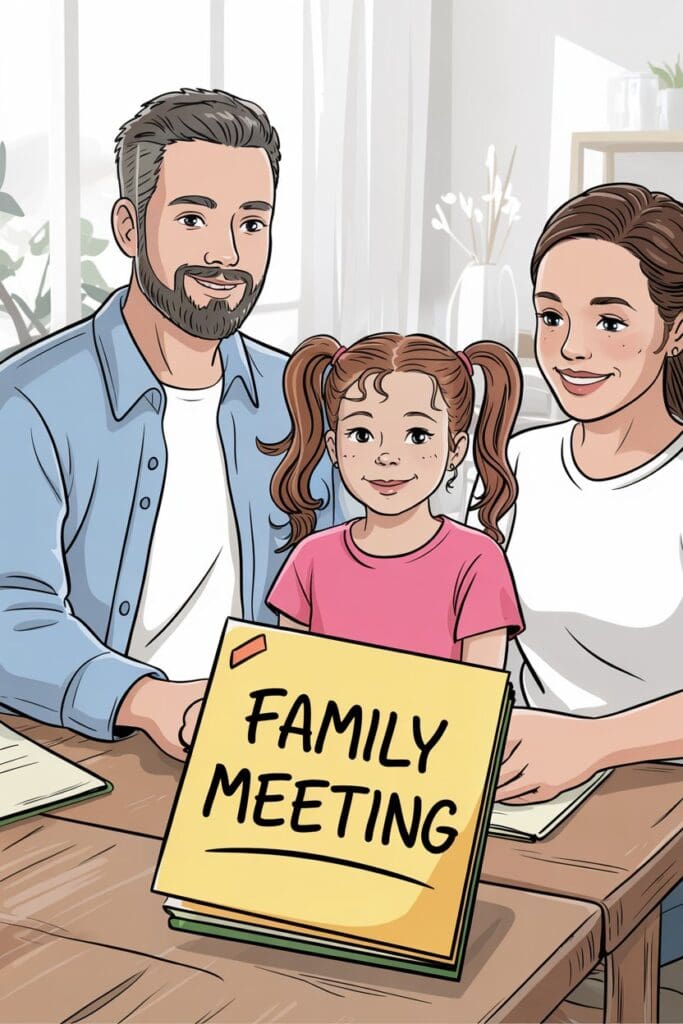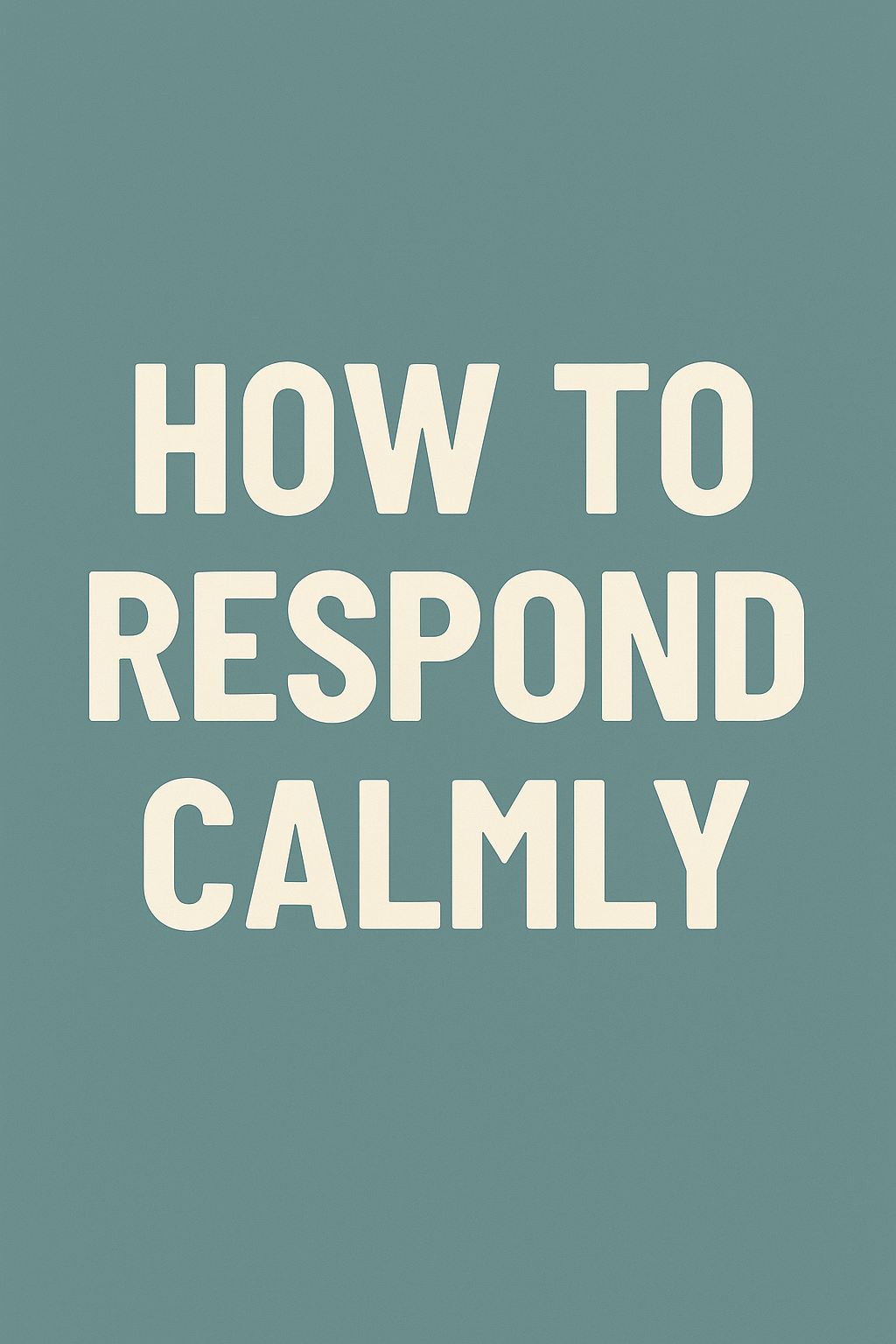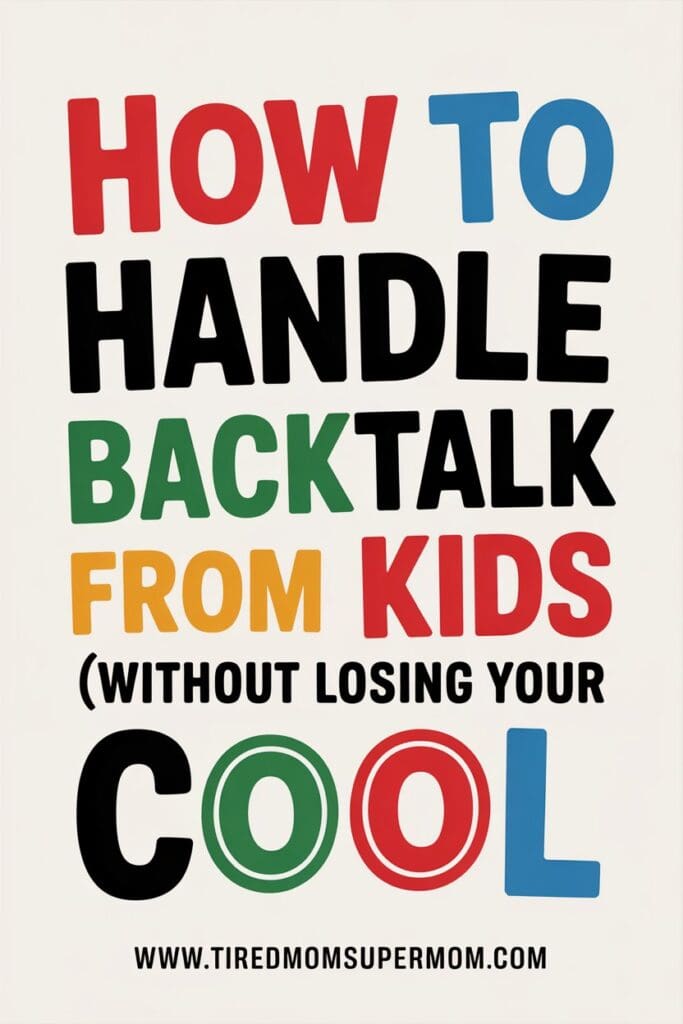7 Powerful Ways to Handle Backtalk from Kids Without Losing Your Cool
Backtalk is one of the most frustrating behaviors a parent can face. Whether it’s a snarky “Whatever, mom” or a full-blown argument, kids talking back can quickly push even the calmest parent to the edge.
But here’s the good news: backtalk isn’t a sign that you’re a bad parent or that your child is out of control. It’s a normal part of development—and with the right tools, you can handle it effectively and even turn it into a teaching moment.
In this guide, we’ll explore how to handle backtalk from kids, why it happens in the first place, and how to respond without yelling, threats, or bribes.
Heads up: This post may include affiliate links. As an Amazon Associate, I earn from qualifying purchases—at no extra cost to you. Full privacy policy and disclosure here.

Why Kids Talk Back
Backtalk can look like sass, sarcasm, or defiance. But at its core, it’s often a symptom of something deeper:
- Seeking control: Kids want a say in their world.
- Testing boundaries: They’re figuring out what’s okay—and what’s not.
- Modeling behavior: If your child hears others talk disrespectfully, they may mirror it.
- Emotional dysregulation: Big feelings with no tools to express them properly.
Understanding the why behind the behavior helps you respond with intention instead of just reacting.
📖 Related: Inspirational Quotes on Upbringing Children You’ll Relate To
Mastering how to handle backtalk from kids requires patience and consistent strategies.
What Not to Do When a Child Talks Back
Before we dive into what to do, let’s talk about common responses that make things worse:
- Yelling: This often escalates the situation.
- Sarcasm: It reinforces the same behavior you’re trying to stop.
- Overreacting: Backtalk is frustrating, but a calm response is more powerful.
- Ignoring completely: While selective ignoring has its place, some forms of disrespect require follow-up.
The key is calm but firm—not harsh.
Need help with calm parenting? Download the No Yelling Parenting Toolbox.
Learning how to handle backtalk from kids is a skill every parent can develop with consistency and patience.
How to Handle Backtalk from Kids: Step-by-Step
1. Stay Calm and Neutral
Your tone matters. If you respond emotionally, your child will too.
Try this script: “I don’t like the way you spoke to me. Let’s try again with respect.”
2. Set Clear Expectations
Backtalk often happens because the boundaries are blurry.
📌 Example: “In our house, we speak to each other kindly. That means no yelling or rude tones.”
Use a family meeting to reinforce house rules. See: Family Meeting Agenda for Kids
3. Use Logical Consequences
If your child is disrespectful, tie the consequence to the behavior.
- Talked back about screen time? Lose screen time for a day.
- Was rude during dinner? Help clean up after without complaining.
More on consequences below.
Parents often seek effective methods on how to handle backtalk from kids to maintain household harmony.
Implementing Logical Consequences to Address Backtalk.
When it comes to discipline for backtalk, consistency is key. Choose consequences that are:
✅ Related to the behavior
✅ Reasonable and age-appropriate
✅ Reversible with effort or apology
Examples of Logical Consequences:
- Loss of privilege (e.g., tablet time, dessert, favorite toy)
- Extra responsibility (e.g., chore swap, helping a sibling)
- Repair the relationship (e.g., write a respectful apology note)
🧰 See also: Best Parenting Books for Positive Discipline
If you’re unsure how to handle backtalk from kids without yelling, start by focusing on calm, clear communication.”

Age-by-Age Tips for Dealing with Backtalk
Toddlers (2–4 Years Old)
Backtalk at this age usually sounds like “No!” or yelling. It’s more about emotion than disrespect.
- Use redirection.
- Teach simple phrases like “Please stop” or “I need help.”
Kids (5–9 Years Old)
This age group pushes limits and may mimic backtalk they hear from peers or media.
- Roleplay respectful responses.
- Reinforce consequences consistently.
Tweens and Teens (10+)
Backtalk here can be full-blown attitude. Stay calm and avoid power struggles.
- Use short, firm responses.
- Set limits, but offer choices: “You can speak kindly, or this conversation ends.”
🧠 For more insights on positive parenting, check out our Positive Parenting Solutions Review.
One of the most effective strategies in how to handle backtalk from kids is using logical consequences that teach rather than punish
Positive Parenting Tools to Reduce Backtalk
If backtalk is becoming a regular issue, consider building a toolbox of techniques:
📚 Helpful Resources
According to WebMD, backtalk is a common developmental phase that can be managed with appropriate strategies.
🧩 Visual Tools
- Emotion charts
- Behavior thermometers
- Respect reminders on the fridge
🗓 Consistency Charts
You can create a simple respect/reward chart to track kind communication.
Family Habits That Prevent Backtalk
Sometimes, behavior change starts before the backtalk begins.
🍽 Weekly Family Meals
A consistent time for conversation helps kids feel heard and less likely to talk back when frustrated.
🗓 Daily Check-ins
Ask questions like:
- “What made you smile today?”
- “What bugged you today?”
💞 1:1 Parent-Child Time
Even 10 minutes a day of undivided attention lowers the need for power struggles.
🧁 Try: Daddy Daughter Date Ideas
Wondering how to handle backtalk from kids in public settings? The key is staying calm and following up at home.

Recommended Products for Calm Parenting
These tools from Amazon can help you manage emotions and teach respect at home.
📘 “How to Talk So Kids Will Listen & Listen So Kids Will Talk”
A must-have parenting book for calm communication.
🧠 Feelings Chart for Kids
Perfect visual aid for helping kids name their emotions instead of yelling them.
🧩 Family Conversation Cards
Use during dinner or wind-down time to foster respectful communication.
⏳ Time Timer
Helps kids manage frustration and transitions—ideal for reducing meltdowns that lead to backtalk.
No matter your parenting style, knowing how to handle backtalk from kids can reduce daily stress and improve family dynamics.
Final Thoughts: You Can Handle Backtalk with Confidence
You’re not alone. Backtalk is one of the top challenges parents face—but it’s also one of the most solvable. By staying calm, setting clear expectations, using logical consequences, and modeling respectful communication, you’ll not only reduce backtalk but teach lifelong skills.
The goal isn’t perfection. It’s progress.
🌟 Start today—print your house rules, hold a short family meeting, and try one of the Amazon tools linked above.
FAQ: How to Handle Backtalk from Kids
What is considered backtalk?
Any rude or argumentative response to a parent’s direction or comment can be considered backtalk. It includes sass, yelling, sarcasm, or undermining statements.
Is backtalk normal at certain ages?
Yes. Backtalk is common during toddlerhood and adolescence—both are stages of seeking independence.
Should I punish or talk it through?
Talk it through and apply consistent consequences. Discipline should teach, not shame.
How can I prevent backtalk before it starts?
Model respectful communication, validate feelings, and offer limited choices to give your child a sense of control.
📌 Don’t forget to save this post!
If you found these tips on how to handle backtalk from kids helpful, make sure to Pin it for later. That way, you’ll have a calm parenting plan ready the next time your child talks back.
✨ Parenting is hard—but you’ve got this!
👉 Follow Tired Mom Supermom on Pinterest for more real-life tips and encouragement.

Ready to foster a more respectful household? Implement these strategies today and share your experiences in the comments below!

This is actually a very good strategy to what, for some, might be a controversial subject. Really nicely though out post. Man a figment of Gods imagination.
Just nice to know these experiences happen to every parent. Good advice.
I appreciated the emphasis on setting clear boundaries and expectations for behavior. It’s so important for kids to understand what is and isn’t acceptable when it comes to communication.
These strategies are not just helpful for handling backtalk, but for improving communication with our children in general. I will definitely be implementing these tips in my parenting toolbox! PS. Thanks for the free class, I’m going to go see about it now!
I love the suggestion to stay calm and focused when dealing with backtalk. It’s easy to get defensive or emotional, but taking a step back and responding thoughtfully can make all the difference.
I appreciate the focus on respectful communication in this post. It’s so important to model good communication skills for our children, and these strategies help to reinforce that.
This post is a game-changer! Backtalk can be so frustrating as a parent, but these easy strategies make it feel manageable. Thank you for sharing!